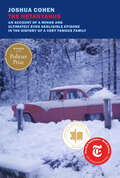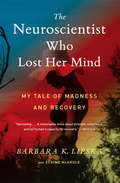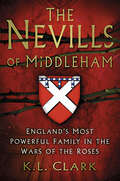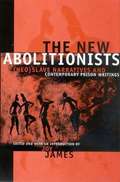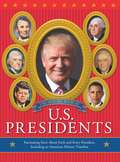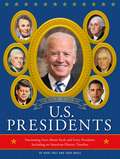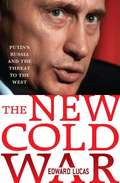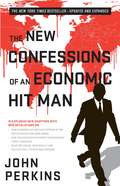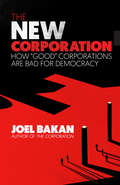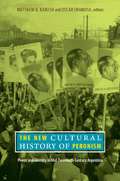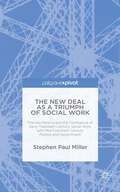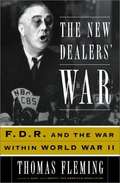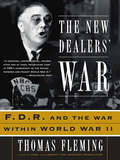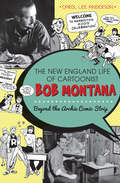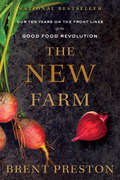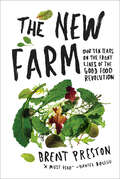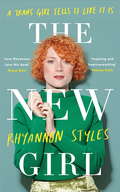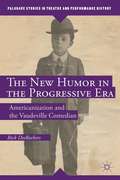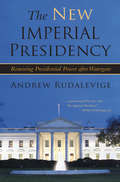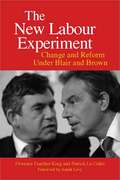- Table View
- List View
The Netanyahus: An Account of a Minor and Ultimately Even Negligible Episode in the History of a Very Famous Family
by Joshua CohenA job interview goes awry for the exiled patriarch of Israel's First Family in this riotous novel from one of contemporary fiction's most brilliant and audacious writers.Corbin College, not quite upstate New York, winter 1959–1960: Ruben Blum, a Jewish historian—but not an historian of the Jews—is co-opted onto a hiring committee to review the application of an exiled Israeli scholar specializing in the Spanish Inquisition. When Benzion Netanyahu shows up for an interview, family unexpectedly in tow, Blum plays the reluctant host to guests who proceed to lay waste to his American complacencies. Mixing fiction with nonfiction, the campus novel with the lecture, The Netanyahus is a wildly inventive, genre-bending comedy of blending, identity, and politics that finds Joshua Cohen at the height of his powers.
The Neuroscientist Who Lost Her Mind: My Tale of Madness and Recovery
by Barbara K. Lipska Elaine McArdleAs a deadly cancer spread inside her brain, leading neuroscientist Barbara Lipska was plunged into madness—only to miraculously survive with her memories intact. In the tradition of My Stroke of Insight and Brain on Fire, this powerful memoir recounts her ordeal and explains its unforgettable lessons about the brain and mind. In January 2015, Barbara Lipska—a leading expert on the neuroscience of mental illness—was diagnosed with melanoma that had spread to her brain. Within months, her frontal lobe, the seat of cognition, began shutting down. She descended into madness, exhibiting dementia- and schizophrenia-like symptoms that terrified her family and coworkers. But miraculously, just as her doctors figured out what was happening, the immunotherapy they had prescribed began to work. Just eight weeks after her nightmare began, Lipska returned to normal. With one difference: she remembered her brush with madness with exquisite clarity. In The Neuroscientist Who Lost Her Mind, Lipska describes her extraordinary ordeal and its lessons about the mind and brain. She explains how mental illness, brain injury, and age can change our behavior, personality, cognition, and memory. She tells what it is like to experience these changes firsthand. And she reveals what parts of us remain, even when so much else is gone.
The Nevills of Middleham: England's Most Powerful Family in the Wars of the Roses
by K. L. ClarkIn 1465, the Nevills must have thought they’d reached the pinnacle of power and influence in England. Richard Nevill was the king’s right-hand man and married to the richest woman in the kingdom; John Nevill was an accomplished soldier who’d done much to stabilise the new dynasty; and George Nevill was not only chancellor but newly enthroned as Archbishop of York.The Nevill women were as active as their male counterparts. As sisters and wives, daughters and daughters-in-laws, they had the ears of the elite in England and were not afraid of wielding their influence. And they were not always on the same side. Cracks in the stability of the most powerful family in England began to show. Rivalries led to serious conflict that worsened when King Edward IV impulsively married Elizabeth Wydeville, a choice of bride that did not please everyone. The Nevills had already lost a great deal for the Yorkist cause. Within six years, as the Wars of the Roses turned into one of the bloodiest periods of English history, they’d lose even more for the Lancastrians.
The New Abolitionists: (Neo)Slave Narratives and Contemporary Prison Writings (SUNY Series, Philosophy and Race)
by Joy JamesThis collection of essays and interviews provides a frank look at the nature and purposes of prisons in the United States from the perspective of the prisoners. Written by Native American, African American, Latino, Asian, and European American prisoners, the book examines captivity and democracy, the racial other, gender and violence, and the stigma of a suspect humanity.
The New Big Book of U.S. Presidents
by Running PressThe New Big Book of U.S. Presidents is the perfect introduction for young readers to learn the lives and times of America's 45 most influential leaders. Readers can learn about our new president and relive the course of American history through digestible information about each president's term in office and the major political issues of each era, as well as through detailed timelines and historical photographs and illustrations throughout. Quick-reference sidebars provide brief summaries of the major events and important people who emerged during each presidential term.This engaging and enlightening book will be a favorite among children studying U.S. history and who crave fun facts that cannot be found in textbooks!
The New Big Book of U.S. Presidents 2020 Edition: Fascinating Facts About Each and Every President, Including an American History Timeline
by Running PressUpdated for 2020, readers can easily relive the course of American history through a detailed timeline, more than 50 vivid photographs and illustrations, information about each president's term in office, and the major political issues of each era.
The New Cambridge Companion to Shakespeare
by Stanley Wells Margreta De GraziaWritten by a team of leading international scholars, this Companion is designed to illuminate Shakespeare's works through discussion of the key topics of Shakespeare studies. Twenty-one brand new essays provide lively and authoritative approaches to recent scholarship and criticism for readers keen to expand their knowledge and appreciation of Shakespeare. The book contains stimulating chapters on traditional topics such as Shakespeare's biography and the transmission of his texts. Individual readings of the plays are given in the context of genre as well as through the cultural and historical perspectives of race, sexuality and gender, and politics and religion. Essays on performance survey the latest digital media as well as stage and film. Throughout the volume, contributors discuss Shakespeare in a global as well as a national context, a dramatist with a long and constantly mutating history of reception and performance.
The New Cold War: Putin's Russia and the Threat to the West
by Edward LucasAs a seasoned veteran correspondent for The Economist, Edward Lucas carefully constructs his assessment of Russia's lack of a clear political identity, and its changing course after the Cold War.
The New Confessions of an Economic Hit Man
by John PerkinsShocking Bestseller: The original version of this astonishing tell-all book spent 73 weeks on the New York Times bestseller list, has sold more than 1.25 million copies, and has been translated into 32 languages. New Revelations: Featuring 15 explosive new chapters, this expanded edition of Perkins's classic bestseller brings the story of economic hit men (EHMs) up to date and, chillingly, home to the US. Over 40 percent of the book is new, including chapters identifying today's EHMs and a detailed chronology extensively documenting EHM activity since the first edition was published in 2004.Former economic hit man John Perkins shares new details about the ways he and others cheated countries around the globe out of trillions of dollars. Then he reveals how the deadly EHM cancer he helped create has spread far more widely and deeply than ever in the US and everywhere else--to become the dominant system of business, government, and society today. Finally, he gives an insider view of what we each can do to change it.Economic hit men are the shock troops of what Perkins calls the corporatocracy, a vast network of corporations, banks, colluding governments, and the rich and powerful people tied to them. If the EHMs can't maintain the corrupt status quo through nonviolent coercion, the jackal assassins swoop in. The heart of this book is a completely new section, over 100 pages long, that exposes the fact that all the EHM and jackal tools--false economics, false promises, threats, bribes, extortion, debt, deception, coups, assassinations, unbridled military power--are used around the world today exponentially more than during the era Perkins exposed over a decade ago.The material in this new section ranges from the Seychelles, Honduras, Ecuador, and Libya to Turkey, Western Europe, Vietnam, China, and, in perhaps the most unexpected and sinister development, the United States, where the new EHMs--bankers, lobbyists, corporate executives, and others--"con governments and the public into submitting to policies that make the rich richer and the poor poorer."But as dark as the story gets, this reformed EHM also provides hope. Perkins offers a detailed list of specific actions each of us can take to transform what he calls a failing Death Economy into a Life Economy that provides sustainable abundance for all.
The New Corporation: How "Good" Corporations Are Bad for Democracy
by Joel BakanFrom the author of The Corporation: The Pathological Pursuit of Profit and Power comes this deeply informed and unflinching look at the way corporations have slyly rebranded themselves as socially conscious entities ready to tackle society's problems, while CEO compensation soars, income inequality is at all-time highs, and democracy sits in aprecarious situation.Over the last decade and a half, business leaders, Silicon Valley executives, and the Davos elite have been calling for a new kind of capitalism. The writing was on the wall. With income inequality soaring, wages stagnating, and aclimate crisis escalating, it was no longer viable to justify harming the environment and ducking taxes in the name of shareholder value. Business leaders realized that to get out in front of these problems, they had to makesocial and environmental values the very core of their messaging. Their essential pitch was: Who could be better suited to address major societal issues than efficiently run corporations? There is just one small problem with theirdoing well by doing good pitch. Corporations are still, ultimately, answerable to their shareholders, and doing well always comes first.This essential truth lies at the heart of Joel Bakan's argument. In lucid and engaging prose, Bakan lays bare a litany of immoral corporate actions and documents corporate power grabs dressed up as social initiatives. He makesclear the urgency of the problem of the corporatization of society itself and shows how people are fighting back and making gains on a grassroots level.
The New Cultural History of Peronism: Power and Identity in Mid-Twentieth-Century Argentina
by Matthew B. Karush Oscar ChamosaIn nearly every account of modern Argentine history, the first Peronist regime (1946-55) emerges as the critical juncture. Appealing to growing masses of industrial workers, Juan Pern built a powerful populist movement that transformed economic and political structures, promulgated new conceptions and representations of the nation, and deeply polarized the Argentine populace. Yet until now, most scholarship on Peronism has been constrained by a narrow, top-down perspective. Inspired by the pioneering work of the historian Daniel James and new approaches to Latin American cultural history, scholars have recently begun to rewrite the history of mid-twentieth-century Argentina. The New Cultural History of Peronism brings together the best of this important new scholarship. Situating Peronism within the broad arc of twentieth-century Argentine cultural change, the contributors focus on the interplay of cultural traditions, official policies, commercial imperatives, and popular perceptions. They describe how the Pern regime's rhetoric and representations helped to produce new ideas of national and collective identity. At the same time, they show how Argentines pursued their interests through their engagement with the Peronist project, and, in so doing, pushed the regime in new directions. While the volume's emphasis is on the first Pern presidency, one contributor explores the origins of the regime and two others consider Peronism's transformations in subsequent years. The essays address topics including mass culture and melodrama, folk music, pageants, social respectability, architecture, and the intense emotional investment inspired by Peronism. They examine the experiences of women, indigenous groups, middle-class anti-Peronists, internal migrants, academics, and workers. By illuminating the connections between the state and popular consciousness, The New Cultural History of Peronism exposes the contradictions and ambivalences that have characterized Argentine populism. Contributors: Anahi Ballent, Oscar Chamosa, Mara Damilakou, Eduardo Elena, Matthew B. Karush, Diana Lenton, Mirta Zaida Lobato, Natalia Milanesio, Mariano Ben Plotkin, Csar Seveso, Lizel Tornay
The New Deal as a Triumph of Social Work: Frances Perkins and the Confluence of Early Twentieth Century Social Work with Mid-Twentieth Century Politics and Government
by Stephen Paul MillerThe New Deal as a Triumph of Social Work
The New Dealers' War: FDR and the War Within World War II
by Thomas J. FlemingTom Fleming takes the reader on a journey through the fractious struggles and debates that went on in Washington and the world as the New Dealers, led by F. D. Roosevelt, strove to impose their will on the conduct of the War. He paints a controversial and very different portrait of FDR's leadership.
The New Dealers' War: Franklin D. Roosevelt and the War Within World War II
by Thomas FlemingAcclaimed historian Thomas Fleming brings to life a flawed and troubled FDR struggling to manage World War II. Starting with the leak to the press of Roosevelt's famous Rainbow Plan, then spiraling back to FDR's inept prewar diplomacy with Japan and his various attempts to lure Japan into an attack on the U. S. Fleet in the Pacific, Fleming takes the reader on a journey through the incredibly fractious struggles and debates that went on in Washington, the nation, and the world as the New Dealers strove to impose their will on the conduct of the War. In bold contrast to the familiar, idealized FDR of other biographies, Fleming's Roosevelt is a man in remorseless decline, battered by ideological forces and primitive hatreds that he could not handle and frequently failed to understand, some of them leading to unimaginable catastrophe. Among FDR's most dismaying policies, Fleming argues, is his insistence on "unconditional surrender" for Germany (a policy that perhaps prolonged the war by as much as two years, leaving millions more dead) and his often-uncritical embrace of and acquiescence to Stalin and the Soviets as an ally. The New Dealers' War is one of those rare books that force readers to rethink what they think they know about a pivotal event in the American past.
The New England Life of Cartoonist Bob Montana: Beyond the Archie Comic Strip
by Carol Lee AndersonThe true story of the artist whose high school years in Massachusetts inspired Riverdale. Bob Montana, creator of the Archie comic strip and one of America&’s greatest cartoonists, always considered himself a true New Englander. Filled with the antics of the rambunctious teenagers of the fictional Riverdale High, Montana&’s comic strip was based on his high school years in Haverhill, Massachusetts. At the height of his career, he lived as a beloved resident in the quaint, picturesque town of Meredith in the heart of the Lakes Region of New Hampshire. For nearly thirty years, he was considered an extraordinarily respected contributor to the community. Drawing from the Yankee humor he saw around him, Montana deftly included local scenes, events, and characters in the puns and pranks of Archie&’s comic-strip life. Join Lakes Region historian Carol Lee Anderson as she takes readers beyond the comic strip and tells the story of the remarkable New England life of Bob Montana.
The New Farm: Our Ten Years on the Front Lines of the Good Food Revolution
by Brent PrestonThe inspiring and sometimes hilarious story of a family that quit the rat race and left the city to live out their ideals on an organic farm, and ended up building a model for a new kind of agriculture.You know those books where the city folks move to the country and have all kinds of crazy misadventures? Where the barnyard is a place of bucolic harmony and each passing season brings the author closer to understanding his proper place in the natural order? You know those books where the primary objective is not so much farming, but writing about farming? This isn’t that kind of book. It’s true that Brent Preston and Gillian Flies did leave the city and move to the country, and they did make a lot of stupid mistakes, some of which are pretty funny in hindsight. But their goal from the beginning was to build a real farm, one that would sustain their family, heal their environment, and nourish their community. It was a goal that was achieved not through bucolic self-reflection, but through a decade of grinding toil and perseverance. Told with humour and heart in Preston’s unflinchingly honest voice, The New Farm is the story of one family’s transition from die-hard urbanites to bona fide farmers and passionate advocates for a more just and sustainable food system. It’s the story of how a couple of young professionals learned not just how to grow food, but how to succeed at the business of farming. And it’s the story of how a small, sustainable, organic farm ended up providing not just a livelihood, but a happy, meaningful and fulfilling way of life.
The New Farm: Our Ten Years on the Front Lines of the Good Food Revolution
by Brent PrestonThis “must-read” memoir of human-scale agriculture offers an insider’s view of today’s food system by a leading voice in sustainable farming (Daniel Boulud). After years of working at the ends of the earth in human rights and development, Brent Preston and his wife were die-hard city dwellers. But when their second child arrived, the shine came off urban living. In 2003 they bought a hundred acres and a rundown farmhouse, determined to build a farm that would sustain their family, nourish their community, heal their environment—and turn a profit. The New Farm is Preston’s memoir of a decade of toil and perseverance. Farming is a complex and precarious business, and they made plenty of mistakes along the way. But as they learned how to grow food, and to succeed at the business of farming, they also found that a small, sustainable, organic farm could be an engine for change, a path to a more just and sustainable food system. Today, The New Farm supplies top restaurants, supports community food banks, hosts events with leading chefs, and grows extraordinary produce. Told with humor and heart, The New Farm is a joy, a passionate book by an important new voice.
The New Financial Capitalists
by George P. Baker George David SmithKohlberg Kravis Roberts's approach to leveraged buyouts was an important aspect of the corporate restructuring and governance reforms in the American economy from the mid-1970s through 1990. During that period, KKR crafted a series of progressively more elaborate deals tailored to specific companies and market conditions. Through its creative debt financing and its relationships with an evolving cast of investors, companies, and managers, KKR drove the scale and scope of the buyout phenomenon to unprecedented highs. This book examines KKR's record in detail. Based upon interviews with partners of the firm and on unprecedented access to KKR's records, George Baker and George Smith have written a balanced and enlightening account of how KKR has approached LBOs. This book focuses on KKR's founding, evolution, and innovations as ways to understand issues in modern American business. In examining KKR as a unique form of enterprise - one that subscribes to a set of alternative perspectives on business and value creation - the book bridges the gap between public perception and academic knowledge of the leveraged buyout, a crucial phenomenon of modern economic life.
The New Girl: A Trans Girl Tells It Like It Is
by Rhyannon Styles'Inspiring and heart-wrenching' Paloma Faith 'Love Rhyannon. Love this book' Grace Dent The remarkable transgender memoir you won't stop hearing about. Rhyannon Styles will do for transgender what Matt Haig did for mental health. Elle columnist Rhyannon Styles tells her unforgettable life story in THE NEW GIRL, reflecting on her past and charting her incredible journey from male to female. A raw, frank and utterly moving celebration of life.Imagine feeling lost in your own body. Imagine spending years living a lie, denying what makes you 'you'. This was Ryan's reality. He had to choose: die as a man or live as a woman.In 2012, Ryan chose Rhyannon. At the age of thirty she began her transition, taking the first steps on the long road to her true self.Rhyannon holds nothing back in THE NEW GIRL, a heartbreakingly honest telling of her life. Through her catastrophic lows and incredible highs, she paints a glorious technicolour picture of what it's like to be transgender. From cabaret drag acts, brushes with celebrity and Parisian clown school, to struggles with addiction and crippling depression, Rhyannon's story is like nothing you've read before.Narrated with searing honesty, humour and poignancy, THE NEW GIRL is a powerful book about being true to ourselves, for anyone who's ever felt a little lost.
The New Girl: A Trans Girl Tells It Like It Is
by Rhyannon Styles'Inspiring and heart-wrenching' Paloma Faith 'Love Rhyannon. Love this book' Grace Dent The remarkable transgender memoir you won't stop hearing about. Rhyannon Styles will do for transgender what Matt Haig did for mental health. Elle columnist Rhyannon Styles tells her unforgettable life story in THE NEW GIRL, reflecting on her past and charting her incredible journey from male to female. A raw, frank and utterly moving celebration of life.Imagine feeling lost in your own body. Imagine spending years living a lie, denying what makes you 'you'. This was Ryan's reality. He had to choose: die as a man or live as a woman.In 2012, Ryan chose Rhyannon. At the age of thirty she began her transition, taking the first steps on the long road to her true self.Rhyannon holds nothing back in THE NEW GIRL, a heartbreakingly honest telling of her life. Through her catastrophic lows and incredible highs, she paints a glorious technicolour picture of what it's like to be transgender. From cabaret drag acts, brushes with celebrity and Parisian clown school, to struggles with addiction and crippling depression, Rhyannon's story is like nothing you've read before.Narrated with searing honesty, humour and poignancy, THE NEW GIRL is a powerful book about being true to ourselves, for anyone who's ever felt a little lost.
The New Grove: Handel
by Winton DeanBiography of George Frederick Handel, including a comprehensive worklist and bibliography, in addition to the definitive view of Handel's life and works.
The New Grove: Haydn
by Jens Peter LarsenBiography of Franz Joseph Haydn, including a comprehensive worklist and bibliography, in addition to the definitive view of Haydn's life and works.
The New Humor in the Progressive Era
by Rick DesrochersBy tracing the effects of unprecedented immigration, the advent of the new woman, and the little-known vaudeville careers of performers like the Elinore Sisters, Buster Keaton, and the Marx Brothers, DesRochers examines the relation between comedic vaudeville acts and progressive reformers as they fought over the new definition of "Americanness. "
The New Imperial Presidency: Renewing Presidential Power after Watergate
by Andrew RudalevigeIn The Imperial Presidency, historian Arthur M. Schlesinger Jr. argued that the Nixon presidency had exceeded its constitutional scope and expanded its power in relation to other branches of government. Of course shortly after the work appeared, Watergate, the ending of the Vietnam War, and other developments led to a resurgence of congressional power in relation to the presidency, although that resurgence has faded as the Imperial Presidency has reasserted itself over recent decades. Rudalevige (political science, Dickinson College) charts these developments, concluding with a discussion of how the legislative deference to the proclaimed powers of the Bush administration in the wake of the September 11th attacks represented a speeded up example of a wider process. Annotation ©2006 Book News, Inc. , Portland, OR (booknews. com)
The New Labour Experiment: Change and Reform Under Blair and Brown
by Florence Faucher-King Patrick Le Galès Gregory ElliottThe authors (both of the Centre d'Etudes Européennes, Sciences Po, France) conduct an assessment of the policies of New Labour under Tony Blair and Gordon Brown and their impact on British policy and government-society relations from 1997 to 2009. They find that New Labour has helped transform Britain into a "market society" while undermining collective democratic purpose. They also argue that ideas of equality have been subordinated to ideas of opportunity. The New Labour society, then, "is a meritorcratic society, geared towards the needs and the priorities of the middle class, but also an inclusive society in which the issue of social justice is bound up with individual effort and brownie points thanks to an ability to make the "right" choices. " Annotation ©2010 Book News, Inc. , Portland, OR (booknews. com)
